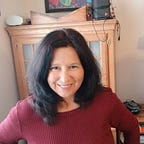Create Original Stories . . . Or Maybe Not
Do you ever wonder as you sit down to create your masterpiece if you are writing a story that has already been told a million times?
Somewhere in the middle of writing Conquest, one of my Lara Rios romances, I had this horrible feeling that I was writing the same romance that has been told a many times over. Nice, family, innocent girl gets seduced by a good-looking playboy while they are competing for the same job. Hmm, I told myself, sure this story has been told before, but my story is different. There’s much more to it than that. And, of course, there was.
A few years later, I was writing Becoming Americana about a tough girl from the “wrong side of town”, her brother is a drug-dealing dangerous character that represents everything she wants to escape. A rich guy from college falls for her and though she likes him, she’s not sure his family would every accept a girl like her. Now, that story has been told a million times too. In fact, the publisher even wrote on the back cover of the book: Can West Side Story ever have a happy ending? Ouch!
This is enough to make me believe I don’t have an original thought in my head, right?
Well, no, not exactly. I never had that feeling. I knew better than to believe that there ARE original story plots. The storyline of lovers being separated by social class has been told over and over again. And the reason it has is because readers like it. And as writers we are smart to write what readers like.
Why No Original Stories?
Each genre has common tropes used because readers kind of expect them. In romance, for example, you’ll find secret baby stories where the unsuspecting guy finds out he’s a dad, enemies to lovers (which is what Conquest was), billionaire with the heart of gold. Second chance at love (I love these).
Romance novels are not the only genres that have these literary conventions. You’ve probably noticed that most superheroes have sidekicks. Horror novels always have the one expendable character who is doing to do something dumb and probably die.
There are plots and literary conventions that are used again and again and if they weren’t used readers would feel lost. They might even feel cheated. Readers expect common plot lines, but not just common plots, but themes that are repeated, motifs like the “chosen one” in sci-fi (Luke Skywalker) reappear often, and each time movies sell tons of tickets and books fly off the shelf.
When new writers begin their journey into the world of fiction, they think they have to create something that has never been written. They want to be original and unique, to be known for a brand new way of writing, to tell a story that has never been told.
In fact, there is a genre of experimental fiction where writers do just that. And often those stories do not make it into the mainstream. A few readers might discover it and love the story, but the general public will not understand it or like it. The writer often goes “undiscovered” and writes for himself or for a small audience.
It’s not that the average reader is dumb, but what happens is that people are attracted to the familiar.
I remember reading about how when musicians create music, if they want it to be successful, their song has to sound like something people have heard before. People will love the song if it reminds them of another song, even if it’s a song they didn’t like. There is comfort in the familiar apparently.
Does this mean that you should go out and copy your favorite novel?
No, you don’t want to do that. But you do want to write stories you like. If you loved Harry Potter and want to write your own similar story, then you should, but it obvious shouldn’t be about a boy who does magic at a magician’s school. I think I’m not only person in the world who has not read Harry Potter, so I don’t know much about the book, but what I’m saying is that you can use the tropes of fantasy novels to create your own version of story about magic or a kid who has powers of some type.
If you enjoy reading a certain type of book, then you want to write the same kind of story you’re passionate about. Follow your heart. Follow your interests.
The originality comes from how you tell the story. What happens in the story? What experiences can you bring to the story that other writers can not? What was it about Harry Potter that you loved and that made you turn the pages? Those aspects of the story you want to keep in your own, but the characters will be those you create, and the experiences they have will the ones you dream up.
The combination of well-known storylines and your unique view and perspective to the story will make your story feel unique and different, yet comfortably familiar also.
And readers will love that. And that is what you want to shoot for. So, forget originality and instead write honestly from your heart about a story you love.
Have a story to tell? Want to learn how to record personal experiences before they’re lost or write a novel? Sign up for Julia Amante’s beginning writing course.
